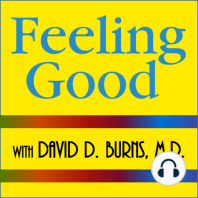84 min listen

196: Ask David: Is There a Dark Side of Human Nature? Is "Forcefulness" Ever Needed in Therapy? Perfectionism, Racism, Schizophrenia & More!
196: Ask David: Is There a Dark Side of Human Nature? Is "Forcefulness" Ever Needed in Therapy? Perfectionism, Racism, Schizophrenia & More!
ratings:
Length:
37 minutes
Released:
Jun 22, 2020
Format:
Podcast episode
Description
in today’s podcast, Rhonda and David address eight fascinating questions submitted by fans like you: What’s the difference between David’s Therapist Toolkit, his eBook (Tools, Not Schools, of Therapy), and the EASY Diagnostic system? Is there a dark side to human nature? Is being “forceful” or confronting patients ever important in therapy? What’s the 5-session schizophrenia cure? How do you suddenly switch into “Sitting with Open Hands” during a session? Questions about OCD Questions about racism What if there are more advantages than disadvantages in perfectionism? What’s the difference between the Toolkit, the eBook, and the EASY Diagnostic system? I am a Licensed Clinical Social Worker (LCSW) and I am interested in either the Toolkit or the EASY diagnostic tool. It looks like the Toolkit includes quite a few questionnaires so I am wondering if I would need both. I would love to have a comprehensive checklist to give to clients during their initial assessment so I originally looked into the EASY Diagnostic tool. I’m just looking for a little guidance on which one would be the most helpful and if I would actually need both. Thanks so much! Cindy What do you think about the idea that there’s a dark side to human nature? Are humans inherently good, as so many mental health professionals seem to believe? It could be entitled, “The Dark Side of Human Nature,” or “Is there REALLY a dark side to human nature?” Jeremy Rhonda and David believe that human beings have positive loving impulses and dark violent impulses as well, and that both are an inherent and basic aspect of human nature. They discuss several aspects, including: The example of cats. They are genetically little serial killers. They love to capture and torture rodents, even if they have had a loving childhood. Many people love violent revenge movies and video games. Many people love killing animals, chopping their heads off, and mounting them on the wall, in much the same way that human serial killers get intense excitement from their killing and torturing, and they also keep trophies. David argues that it is important for therapists to recognize and address the dark side—areas where therapists will typically get in trouble due to blindness / denial / rationalization of negative motives, and excessive idealism. Problematic areas for therapists can include: the suicidal patient the violent patient—David describes a woman who was plotting to kill her husband. disability patients with a hidden agenda of remaining disabled. patients who don’t want to do their therapy homework people, for the most part, don’t get addicted because they’re depressed, anxious, or lonely, but because it’s really awesome to get plastered / high. Many, and perhaps all humans, like to judge others and feel superior to them, and also enjoy exploiting others, but our denial can be intense. People enjoy bullying people. It makes you feel powerful and generates feelings of excitement. We acknowledge that although the dark side to human nature may be strongly influenced by our genes, the environment we grow up in can also have a strong impact on our thoughts, feelings and impulses. Is being “forceful” or confronting patients ever important in therapy? This is another great question submitted by Jeremy Karmel. David gives many examples of times when it is absolutely necessary to be forceful and confrontational in therapy, but this requires a strong therapeutic relationship with the patient and perfect empathy scores and high levels of trust and mutual respect. Therapeutic examples where forcefulness or confrontation may be important include: Exposure techniques in the treatment of anxiety. The patient will nearly always “wimp out” at the last minute, and here is where the therapist needs to push—but most therapists will back off out of misguided “niceness.” Pushing the patient to view his/her own role in a relationship conflict instead of buying into the idea that the patient is the innocent v
Released:
Jun 22, 2020
Format:
Podcast episode